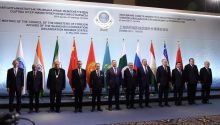by Pepe Escobar, Strategic Culture:

Something very important happened earlier this week in Astana during the meeting of the Council of Ministers of Foreign Affairs of the Shanghai Cooperation Organization (SCO).
Chinese Foreign Minister Wang Yi went straight to the point: he called for SCO members to “maintain their strategic autonomy”, and “never allow external forces” to turn Eurasia into a “geopolitical arena.”
Wang Yi detailed how “a few countries are pursuing hegemony and power, forming small cliques, establishing hidden rules, engaging in interference and suppression, ‘decoupling and cutting off ties,’ and even assisting the ‘three forces’ in the region”, thus attempting to suppress the strategic autonomy of the Global South.
TRUTH LIVES on at https://sgtreport.tv/
The “three forces” is Chinese code for terrorism, separatism and religious extremism – actually the three main reasons for the foundation of the SCO way back in 2001, a short while before 9/11.
The straightforward translation of Wang’s message points to Beijing being very much aware of the Hegemon’s myriad Hybrid War tactics now deployed all across the Heartland. Still, Beijing excels in politeness, calling for “common, comprehensive, cooperative and sustainable” security cooperation and to work with the “international community”.
The problem is the “international community” is a hostage of the “rules-based international order”.
Redefining the “three forces”
The next meeting of SCO heads of state is in Astana in July – only one month after a crucial BRICS ministerial meeting in Russia. Two months ago, Kazakh President Kassym-Jomart Tokayev, at a meeting in Boao in Hainan province in China, made it clear that all leaders of SCO member states simply cannot skip it.
Sooner rather than later, perhaps as early as next year, BRICS and SCO may be working not only in tandem but possibly sharing the same table.
This year’s SCO summit is not only crucial in terms of re-organizing a real war on terror against Hegemon-driven tactics – but also about SCO expansion and improved economic/trade cooperation.
Belarus will become a full SCO member in July – as President Lukashenko already confirmed. And last year Saudi Arabia’s cabinet also approved the decision to join the SCO.
Only three months ago in Beijing, during the celebration of the 20th anniversary of the SCO secretariat, Wang echoed President Xi at the end of his fateful face to face meeting with Putin in Moscow in 2023: “Changes unseen in a century” are on. Hence the renewed importance of the SCO – the de facto largest non-Western multilateral organization focused on political/security cooperation, and one of the pillars of multipolarity.
It’s idle to point out once again that the SCO is either ignored, dismissed or misunderstood by the collective West – as it is not based on NATO-style endless military expansion. The SCO is totally about South-South integration. It’s no mean feat to have India, China, Pakistan and Iran on the same table discussing as equals – and respecting the priorities of their Central Asia/Heartland partners.
Over the years, everything ended up being discussed at the SCO table – way beyond the initial focus on the “three forces”: diplomacy, national defense, security, economy, trade, culture, education, transportation, technology, agriculture.
As much as the SCO is at the heart of the multimodal Russia-China strategic partnership, it is also driving the increasing economic interconnection of China and the Central Asian “stans”.
In the Year of the Great Decision – where the Russian presidency of BRICS should be outlining the privileged road map for a more equal system of international relations – SCO players seem to be fully aware that the “three forces” not accidentally constitute the preferred Hybrid War tactics deployed by the Empire of Chaos to Divide and Rule.
That applies not only to shady jihadi outfits such as ISIS-Khorasan but also to the imperial grip over drugs, human and organ trafficking global rackets.
Slowly and surely we are reaching the next level: the SCO going all out, as a multilateral organization, against the terror tactics of a Hegemon which even abets genocide.
Russian Foreign Minister Sergey Lavrov could not be more explicit at the end of the Astana summit:
“The task of developing common approaches to ensuring Eurasian security and cooperation by the states of this continent themselves is urgent. We stressed that the SCO may well play the role of a catalyst for these processes, involving other partners in the region.”
In practice, Lavrov mentioned a new drive for the Executive Committee of the Regional Anti-Terrorist Structure (RATS). Translation: RATS will expand its mandate on information security, fighting organised crime and digging deeper into the connections between drug trafficking and terrorism financing.
Read More @ Strategic-Culture.org



